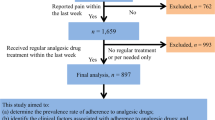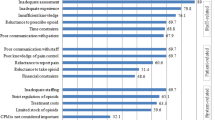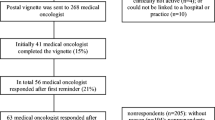Abstract
This study describes pain experience, analgesic use and barriers to pain control in African American cancer patients (N = 116). The overall adherence rate of analgesics was 46%. Constipation and nausea were the most commonly cited side effects of analgesics. Eighty-seven percent of patients reported concern about addiction to analgesics. Patients who believed their doctor needed to focus on curing illness rather than on controlling pain tended to comply with analgesic prescriptions (r = 0.20, p < 0.05). Patients with concerns that analgesics may cause confusion were less likely to take any type of analgesics (r = −0.16, p < 0.05). The study confirms that a patient’s perceived barriers influence their decision to take analgesics, and also suggests that African American cancer patients may benefit from education that prevents misconceptions about analgesic use.
Similar content being viewed by others
References
Portenoy RK, Coyle N. Controversies in the long-term management of analgesic therapy in patients with advanced cancer. J Pain Symptom Manage. 1990;5(5):307–19.
Levy MH. Pharmacologic treatment of cancer pain. New Engl J Med. 1996;335(15):1124–32.
Potter VT, Wiseman CE, Dunn SM, Boyle FM. Patient barriers to optimal cancer pain control. Psycho-Oncology. 2003;12(2):153–60.
Palos GR, Mendoza TR, Cantor SB, et al. Perceptions of analgesic use and side effects: what the public values in pain management. J Pain Symptom Manage. 2004;28(5):460–73.
Salimah H, Keane A. Preference for analgesic treatment for cancer pain among African Americans. J Pain Symptom Manage. 2007;34(2):136–47.
Cleeland CS, Baez L, Pandya KJ. Pain and treatment of pain in minority patients with cancer. Ann Intern Med. 1997;127(9):813–6.
Todd KH, Lee T, Hoffman JR. The effect of ethnicity on physician estimates of pain severity in patients with isolated extremity trauma. JAMA. 1994;271(12):925–8.
Todd KH. Pain assessment and ethnicity. Am Emerg Med. 1996;27(4):421–3.
Ng B, Dimsdale JE, Rollnik JD, Shapiro H. The effect of ethnicity on prescriptions or patient-controlled analgesia for post-operative pain. Pain. 1996;66(1):9–12.
Ersek M, Kraybill BM, Pen AD. Factors hindering patient’s use of medications for cancer pain. Cancer Pract. 1999;7(5):226–32.
Walker VA, Hoskin PJ, Hanks GW, White ID. Evaluation of WHO analgesic guideline for cancer pain in a hospital-based palliative care unit. J Pain Symptom Manage. 1988;3(3):145–9.
Huang HY, Wilkie DJ, Zong SP, et al. Developing a computerized data collection and decision support system for cancer pain management. Comput Inform Nurs. 2003;21(4):206–17.
Glajchen M. Chronic pain: treatment barriers and strategies for clinical practice. Chronic Pain. 2001;14(3):211–8.
Lai YH, Keefe FJ, Sun WZ, et al. Relationship between pain-specific beliefs abd adherence to analgesic regimens in Taiwanese cancer patients. J Pain Symptom Manage. 2002;24(4):415–23.
Miaskowski C, Dodd MJ, West C, et al. Lack of Adherence with the analgesic regimen: a significant barrier to effective cancer pain management. J Clin Oncol. 2001;19(23):4275–9.
Enting RH, Oldenmenger WH, Van Gool AR, et al. The effects of analgesic prescription and patient adherence on pain in a Dutch outpatient cancer population. J Pain Symptom Manage. 2007;34(5):523–31.
Schieffer BM, Pham Q, Labus J, et al. Pain medication beliefs and medication misuse in chronic pain. J Pain. 2005;6(9):620–9.
Zhukovsky DS, Gorowski E, Hausdorff J, Napolitano B, Lesser M. Unmet analgesic needs in cancer patients. J Pain Symptom Manage. 1995;10(2):113–9.
Paice JA, Toy C, Shott S. Barriers to caner pain relief: fear of tolerance and addiction. J Pain Symptom Manage. 1998;16(1):1–9.
Im EO, Lim HJ, Clark M, Chee W. African-American cancer patients’ pain experience. Cancer Nurs. 2008;31(1):38–48.
Al-Atiyyat NM. Cultural diversity and cancer pain. J Hosp and Palliat Nurs. 2009;11(3):154–64.
Ward SE, Goldberg N, Miller-McCauley V, et al. Patient-related barriers to management of cancer pain. Pain. 1993;52(3):319–24.
Anderson KO, Richman SP, Hurley J, et al. Cancer pain management among underserved minority outpatients. Cancer. 2002;94(8):2295–304.
Anderson KO, Green CR, Payne R. Racial and ethnic disparities in pain: causes and consequences of unequal care. J Pain. 2009;10(12):1187–204.
Hagen NA, Elwood T, Ernst S. Cancer pain emergencies: a protocol for management. J Pain Symptom Manage. 1997;14(1):45–50.
Author information
Authors and Affiliations
Corresponding author
Rights and permissions
About this article
Cite this article
Rhee, Y.O., Kim, E. & Kim, B. Assessment of Pain and Analgesic Use in African American Cancer Patients: Factors Related to Adherence to Analgesics. J Immigrant Minority Health 14, 1045–1051 (2012). https://doi.org/10.1007/s10903-012-9582-x
Published:
Issue Date:
DOI: https://doi.org/10.1007/s10903-012-9582-x




